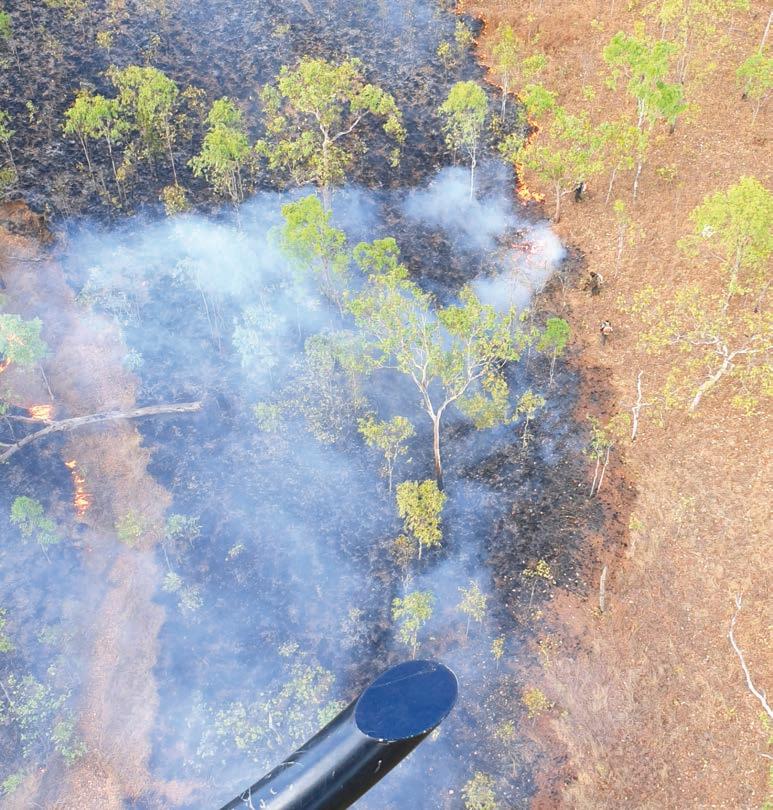
3 minute read
New carbon farming Code recognises native title rights
The Indigenous Carbon Industry Network (ICIN) members gather at the inaugural ICIN Meeting in Darwin, 2019. Photo: CDU – RIELICIN.
Native title groups will need to give free, prior, and informed consent to carbon farming projects following a new Code of Conduct by the Carbon Market Institute.
Advertisement
Carbon farming involves changing land management and agricultural practices to reduce the green-house gas emissions from livestock, soil, or vegetation (known as avoidance), or by storing additional carbon in vegetation and soils (known as sequestration).
Keeping carbon in the ground generates carbon credits which can be sold through federal government auctions. The Australian Carbon Industry Code of Conduct will ensure farmers share economic opportunities, including the Emissions Reduction Fund/Climate Solutions Fund, without excluding native title groups.
As carbon farming is a specific nonpastoral land use, it comes with separate regulatory requirements including native title consent. The Carbon Credits (Carbon Farming Initiative) Act 2011 (Cth) does not say how carbon farmers should seek consent from native title groups.
The Indigenous Carbon Industry Network (ICIN) noticed this gap in the Act and collated best practice guidelines on seeking free, prior, and informed consent from native title holders that have been included in the Code.
ICIN Coordinator Anna Boustead says the Network enables and empowers Indigenous carbon producers and traditional owners of carbon projects to benefit from carbon markets through their land and sea management practices. “The carbon industry has positioned itself as a sustainable and ethical industry which will support outcomes that are good for country and good for communities,” Ms Boustead explains. “It is important that business practices of carbon project developers, brokers and agents which seek to profit from the production of carbon credits reflect these high standards.
“We want to see the carbon industry become a shining light in recognising Indigenous rights and interests to realise these remarkable opportunities – but the industry has some way to go yet.”
In northern Australia where carbon farming has taken off, Indigenousowned carbon projects are delivering multiple outcomes including better fire management, protection of cultural sites, improved biodiversity, infrastructure, and investment in community programs.
South Australia’s number of carbon farming projects is behind the rest of Australia, but this will change with a review of the Pastoral Act according to Primary Industries and Regional Development Minister David Basham.
“At this point in the pastoral rangelands area, we only have three projects that are in operation, that’s in relation to about 300 nationally, so we’re 1 percent of the opportunities (that have) been taken up,” Mr Basham said.
South Australian Native Title Services (SANTS) CEO Keith Thomas recognises the potential of carbon farming in South Australia and says the Code fills in the gaps of the Carbon Credits (Carbon Farming Initiative) Act 2011 (Cth).
“I would like to commend the Indigenous Carbon Industry Network for their commitment to incorporate best practice guidelines in the Australian Carbon Industry Code of Conduct,” Mr Thomas said.
“SANTS is helping one native title holder negotiate their involvement in a carbon project with a South Australian pastoralist and the Code will be an important guide in this process.”
Currently pastoral leases last for 42 years in South Australia, however that could be expanded to 100 years under the state government’s review of the Pastoral Act. This is more reason for native title holders to be included in carbon farming projects taking place on their country.

Find out more about Indigenous Carbon Industry Network: icin.org.au
Read the Australian Carbon Industry Code of Conduct: carbonmarketinstitute.org/code


